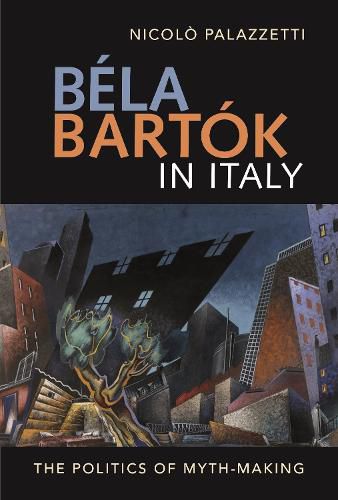Readings Newsletter
Become a Readings Member to make your shopping experience even easier.
Sign in or sign up for free!
You’re not far away from qualifying for FREE standard shipping within Australia
You’ve qualified for FREE standard shipping within Australia
The cart is loading…






This book examines the reputation of the Hungarian composer Bela Bartok (1881-1945) as an antifascist hero and beacon of freedom. Following Bartok’s reception in Italy from the early twentieth century, through Mussolini’s fascist regime, and into the early Cold War, Palazzetti explores the connexions between music, politics and diplomacy. The wider context of this study also offers glimpses into broader themes such as fascist cultural policies, cultural resistance, and the ambivalent political usage of modernist music.
The book argues that the ‘Bartokian Wave’ occurring in Italy after the Second World War was the result of the fusion of the Bartok myth as the ‘musician of freedom’ and the Cold War narrative of an Italian national regeneration. Italian-Hungarian diplomatic cooperation during the interwar period had supported Bartok’s success in Italy. But, in spite of their political alliance, the cultural policies by Europe’s leading fascist regimes started to diverge over the years: many composers proscribed in Nazi Germany were increasingly performed in fascist Italy. In the early 1940s, the now exiled composer came to represent one of the symbols of the anti-Nazi cultural resistance in Italy and was canonised as ‘the musician of freedom’. Exile and death had transformed Bartok into a martyr, just as the Resistenza and the catastrophe of war had redeemed post-war Italy.
$9.00 standard shipping within Australia
FREE standard shipping within Australia for orders over $100.00
Express & International shipping calculated at checkout
This book examines the reputation of the Hungarian composer Bela Bartok (1881-1945) as an antifascist hero and beacon of freedom. Following Bartok’s reception in Italy from the early twentieth century, through Mussolini’s fascist regime, and into the early Cold War, Palazzetti explores the connexions between music, politics and diplomacy. The wider context of this study also offers glimpses into broader themes such as fascist cultural policies, cultural resistance, and the ambivalent political usage of modernist music.
The book argues that the ‘Bartokian Wave’ occurring in Italy after the Second World War was the result of the fusion of the Bartok myth as the ‘musician of freedom’ and the Cold War narrative of an Italian national regeneration. Italian-Hungarian diplomatic cooperation during the interwar period had supported Bartok’s success in Italy. But, in spite of their political alliance, the cultural policies by Europe’s leading fascist regimes started to diverge over the years: many composers proscribed in Nazi Germany were increasingly performed in fascist Italy. In the early 1940s, the now exiled composer came to represent one of the symbols of the anti-Nazi cultural resistance in Italy and was canonised as ‘the musician of freedom’. Exile and death had transformed Bartok into a martyr, just as the Resistenza and the catastrophe of war had redeemed post-war Italy.